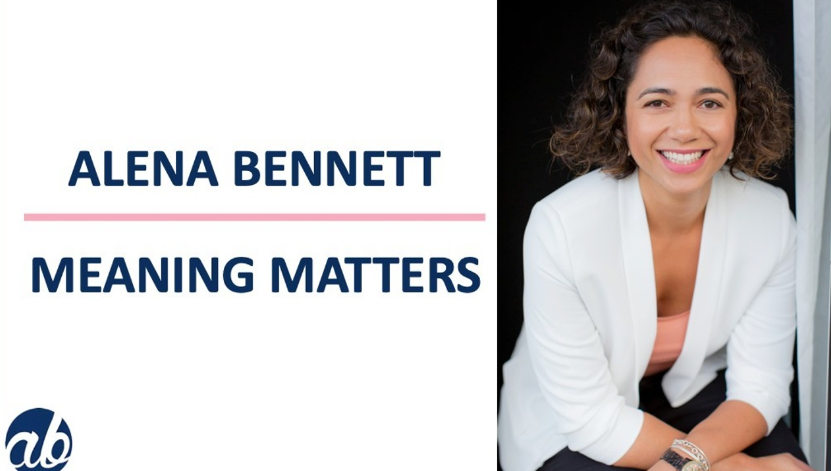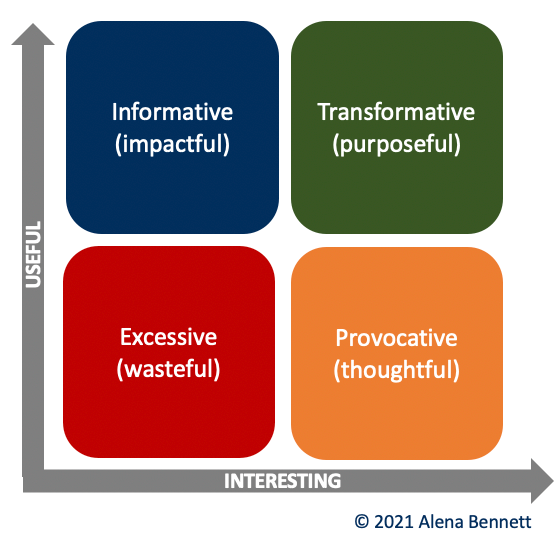I wrote an article a little while ago on the value of relevant communication: and looking at the idea of 'relevance' as a function of whether communication was deemed to be interesting and useful. You see, leaders in finance have a habit of focusing on providing information that is useful for their boss, their team and their stakeholders. They do so thinking that this is what it needed in order to fulfil a request for information - in fact, they might argue, they provide exactly what is requested.
Taking this approach, however, fails to recognise that we operate in a world that is information heavy. In fact, so much so that we now:
• interpret big data as opposed to analyse individual samples,
• we skim headlines instead of reading complete articles, and
• we tweet instead of talk.
In a world so full of information, we can't simply rely on its 'use' to ensure it is read, understood and applied. The key is to incorporate a level of interest into the equation: once we pique interest, we can penetrate with a message and influence whatever outcome we're trying to achieve with the information.
In this week's article, I'd like to share how this translates into the effectiveness of a CFO's leadership approach, particularly when it comes to galvanising your team around priorities.
Why do we care about whether we make something interesting for our teams?
When our teams find a a task, an activity or a project interesting various things happen:
• it engages their interest, which is going to encourage them to take action
• it reminds them that they are working for the right team and the right boss
• as a result of the above, it makes them feel valued
• it makes them feel connected with the other people in the team that share that interest and most importantly
• they want to contribute
In short, when your team find something interesting, they ask themselves the question, "Would I like to contribute?". Without you doing anything particularly overt, your team are encouraged to lean in and collaborate, which is the first step to team cohesion.
Is being interesting more important than a project or task's 'use'?
In short, no. When all is said and done, finance professionals are obsessed with helping people. They take service seriously and they want to ensure the information they prepare and the tasks they perform are useful for those who need it. It sits at the heart of service and also that of efficiency and effectiveness - in fact, if our teams deem something useless, you'll find it very difficult to motivate them to do it. 'Why should I?', they'll think. 'Why should I invest this time doing something useless when I have a pile of work that is actually of value that also needs to be done?'. Fair call, I say.
When determining whether or not a project is useful, your team needs to be able to answer 'yes' to the following question, "Will it achieve our Finance team's purpose, strategy and goals?"
Using the interesting and useful framework
Whilst the questions above are useful in and of themselves, it gets more interesting (and useful!) when we look at the relationships between these concepts:
Informative (Impactful): when CFOs look at their leadership only through the lens of work that is highly 'useful', it is effective to a point. In fact, focusing on information serves to make 'a point' - it has impact. However, when you consider the landscape of the finance function and how technology and AI is taking over the number crunching, it's fair to say that providing will become and remain the job of the computers, which will in the long term will reduce the impact of information alone.
If you find yourself focused on the task, and delivering useful reports without consideration of its interest (let's face it, we still joke with each other about many of our reports solving sleeping problems), put yourself in the recipient's shoes. I was told by one of my mentors that when you're hosting virtual events "you're competing with Netflix". I'd say as a CFO, you're competing with your market or industry peers and you need to think bigger than impact and information alone.
As yourself the following: Am I thinking big enough?
Excessive (wasteful): When CFOs don't take the time consider the interest in or use of a particular task, quite frankly it's a waste. In an environment that is fast paced, action oriented but most importantly, results obsessed, failing to consider use or interest is dangerous.
Ask yourself these 2 simple questions:
• Am I taking sufficient time to consider whether this is useful?
• What would be the impact on our ability to achieve our objectives if my stakeholders or team were interested in this?
Provocative (thoughtful): It is a CFOs job to be a visionary and inspirational. Your ability to think big picture is one of the key differentiators between them and their staff. But if you don't have the ability to connect your big picture thinking in a way that guides your team (who are in the detail), then your team won't deliver results. Everything you say, all your great ideas, will stay simply that: ideas.
If you find yourself frustrated because of the fact your team aren't implementing consider the following:
• Is this a useful idea or task for today? When might that idea or task be useful? Remember: you can do everything but not at the same time!
• How do you need to do things differently to demonstrate its (the task or project) use and make it happen?
Transformative (purposeful): CFOs who can balance the art of interest with the science of use are the ones that transform teams and in doing so, cultures. They are the true leaders of the executive team and place themselves firmly as the left hand to the CEO's right. When CFOs can make something useful and interesting to their teams, they connect to purpose and this is where meaningful and sustainable change happens.
If you want to be a transformative CFO, ask yourself:
• How do I demonstrate that this task or project connects to our team purpose?
• How can I make it easy for my team to want to contribute?
Make your leadership count: be a transformative CFO
If you need to develop a cohesive team that delivers to your strategy, consider the following:
How cohesive is your team and how well are they delivering to your expectations or that of your stakeholders?
What actions can you take to be more purposeful in your leadership?
What information do you need to know from your team, your CEO or your stakeholders to make it interesting?
CEOs are looking for finance teams to be the catalyst for change. Finance teams are looking for opportunities to grow. They are seeking transformative CFOs.



